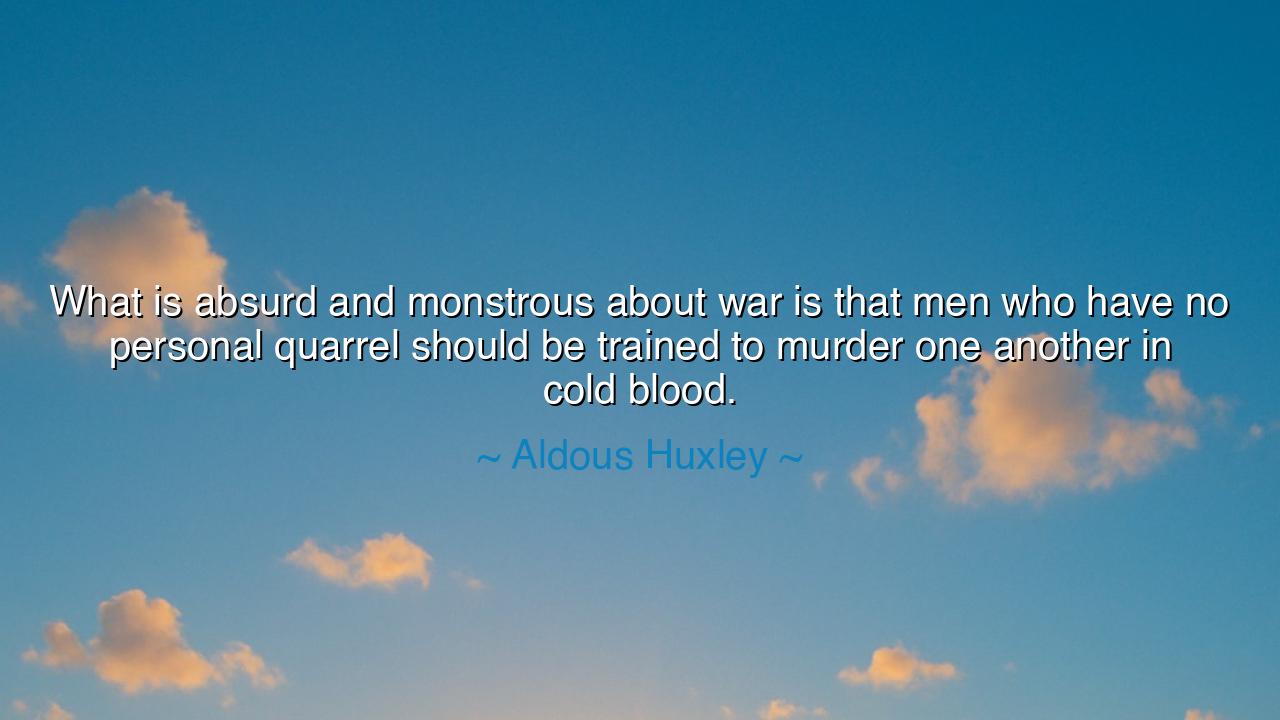
What is absurd and monstrous about war is that men who have no
What is absurd and monstrous about war is that men who have no personal quarrel should be trained to murder one another in cold blood.






Hear the lament of Aldous Huxley, sharp of mind and piercing of spirit: “What is absurd and monstrous about war is that men who have no personal quarrel should be trained to murder one another in cold blood.” These words are not mere philosophy, but a cry from the heart of a man who lived through the brutalities of the twentieth century. Huxley saw clearly the madness of war—that men who might have been friends, neighbors, even brothers in another life, are taught to kill each other because powers beyond them decree it so. The absurdity lies not only in the bloodshed but in the fact that it is waged by those with no true cause against one another.
The origin of this reflection comes from the wars that scarred Europe, especially the Great War, where millions of young men were sent into trenches, slaughtered by machines of death they had no hand in creating. They did not hate one another personally; their quarrel was not born of insult or betrayal. They were ordered, trained, and driven to kill by nations, kings, and ideologies. Thus, Huxley calls it monstrous—for what can be more unnatural than to take the common sons of humanity, strip them of choice, and turn them into instruments of slaughter against their own kind?
History offers many examples. Consider the Christmas Truce of 1914. In the frozen mud of the Western Front, British and German soldiers, weary of killing, laid down their rifles. They crossed into no man’s land, exchanged gifts, played football, and sang carols together. For a brief moment, they remembered that they were men, not enemies—that they shared laughter, hunger, and hope. Yet soon after, they were forced back into the trenches to resume the killing. The truce revealed the truth Huxley names: the war was not born of their quarrels, but of commands issued by distant rulers.
The monstrosity of war is also its betrayal of the human heart. A farmer may raise his son to till the soil, a mother may dream of her child becoming a scholar, and yet the state trains him instead to fire upon strangers who never wronged him. Two young men, meeting by chance, might share food, tell stories, and find kinship; yet in war, they are stripped of their humanity, reduced to uniforms, and instructed to aim at each other’s hearts. The coldness of such calculated murder is what Huxley found unbearable.
Yet within this horror is also a call to wisdom. If wars are fought by men with no quarrel, then the quarrel belongs to leaders, ideologies, and systems that seek dominion. To see this truth is to resist the lie that those on the other side are monsters. They are not; they are men like us. And if they are like us, then perhaps wars are not inevitable, but can be prevented by refusing to become pawns in struggles that are not our own.
The lesson is timeless: beware of hatred not born of your own heart. Do not be quick to take up arms against those whom you do not know, whose lives mirror your own. Question the voices that seek to pit man against man for causes shrouded in banners and speeches. Remember that those called “enemies” are often just as unwilling, just as compelled, and just as human.
Therefore, O seekers, let Huxley’s wisdom dwell in you: resist the absurdity of war. Do not let your hand be guided by quarrels not your own. Seek peace where you can, and when others demand enmity, remember the soldier across the field who, like you, dreams of home, of warmth, of life. For only when we remember our shared humanity can we break the monstrous cycle, and build a world where men no longer train to murder strangers, but to live with them as brothers.






AAdministratorAdministrator
Welcome, honored guests. Please leave a comment, we will respond soon